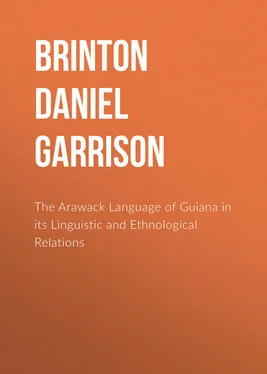atenennuati, first.
ibiamattéti, second.
wakábbuhinteti, our third, etc.
To the question, How many at a time? the answer is:
likinnekewai, one alone.
biamanuman, two at a time, etc.
If simply, How many? it is:
abbahu, one.
biamahu, two.
If, For which time? it is:
tibíakuja, for the first time.
tibíamattétu, for the second time.
and so on.
The verbs are sometimes derived from nouns, sometimes from participles, sometimes from other verbs, and have reflexive, passive, frequentative, and other forms. Thus from lana , the name of a certain black dye, comes lannatün to color with this dye, alannatunna to color oneself with it, alannattukuttun to let oneself be colored with it, alanattukuttunnua to be colored with it.
The infinitive ends in in , ün , ùn , ân , unnua , ên , and ûn . Those in in , ün , ùn , and ân are transitive, in unnua are passive and neuter, the others are transitive, intransitive, or neuter.
The passive voice is formed by the medium of a verb of permission, thus:
amalitin, to make.
amalitikittin, to let make.
amalitikittunnua, to be made.
assimakin, to call.
assimakuttün, to let call,
assimakuttùnnua, to be called.
The personal pronouns are united to the verbs as they are to the nouns. They precede all verbs except those whose infinitives terminate in ên , in , and ân , to which they are suffixed as a rule, but not always. When they follow the verb, the forms of the pronouns are either de , bu , i he, n she, it, u , hu , je or da , ba , la , ta , wa , ha , na . The latter are used chiefly where the negative prefix m , ma or maya is employed. Examples:
hallikebben, to rejoice
hallikebbéde, I rejoice.
hallikebbébu, thou rejoicest.
hallikebbéi, he rejoices.
hallikebbên, she rejoices.
hallikebbéu, we rejoice.
hallikebbéhü, you rejoice.
hallikebbéje, they rejoice.
majauquan, to remain
majáuquada, I remain.
majáuquaba, thou remainest.
majáuquala, he remains.
majáuquata, she remains.
majáuquawa, we remain.
majáuquaha, you remain.
majáuquana, they remain.
Moods and Tenses. Their verbs have four moods, the indicative, optative, imperative, and infinitive, and five tenses, one present, three preterites, and one future. The rules of their formation are simple. By changing the termination of the infinitive into a , we have the indicative present, into bi the first preterite, into buna the second preterite, into kuba the third preterite, and into pa the future. The conjugations are six in number, and many of the verbs are irregular. The following verb of the first conjugation illustrates the general rules for conjugation:
ayahaddin, to walk.
Indicative Mood
Present tense:
dayahadda, I walk.
bujahadda, thou walkest.
lujahadda, he walks.
tüjahadda, she walks.
wayahádda, we walk.
hujahádda, you walk.
nayuhádda, they walk.
First preterite – of to-day:
dayaháddibi, I walked to-day.
bujaháddibi, thou walked to-day.
lijaháddibi, he walked to-day.
tujaháddibi, she walked to-day.
wayaháddibi, we walked to-day.
hujaháddibi, you walked to-day.
nayaháddibi, they walked to-day.
Second preterite – of yesterday or the day before.
dayahaddibüna, I walked yesterday or the day before.
bujaháddibüna, thou walked yesterday or the day before.
lijaháddibuna, he walked yesterday or the day before.
tujaháddibüna, she walked yesterday or the day before.
wayaháddibüna, we walked yesterday or the day before.
hujaháddibüna, you walked yesterday or the day before.
nayaháddibüna, they walked yesterday or the day before.
Third preterite – at some indefinite past time:
dayaháddakuba, I walked.
bujaháddakuba, thou walked.
lijaháddakuba, he walked.
tujaháddakuba, she walked.
wayaháddakuka, we walked.
hujaháddakuba, you walked.
nayaháddakuba, they walked.
Future:
dayaháddipa, I shall walk.
bujaháddipa, thou wilt walk.
lijaháddipa, he will walk.
tujaháddipa, she will walk.
Конец ознакомительного фрагмента.
Текст предоставлен ООО «ЛитРес».
Прочитайте эту книгу целиком, купив полную легальную версию на ЛитРес.
Безопасно оплатить книгу можно банковской картой Visa, MasterCard, Maestro, со счета мобильного телефона, с платежного терминала, в салоне МТС или Связной, через PayPal, WebMoney, Яндекс.Деньги, QIWI Кошелек, бонусными картами или другим удобным Вам способом.
Since reading this article before the Society, Prof. S. S. Haldeman has shown me a copy of a work with the title: “ Die Geschichte von der Marterwoche, Auferstehung und Himmelfahrt unsers Herrn und Heilandes Jesu Christi. Uebersetzt in die Aruwackische Sprache und erklärend umschrieben. Philadelphia: Gedruckt bey Carl List, 1799 ,” 8vo. pages 213, then one blank leaf, then 40 pages of “Anmerkungen.” There is also a second title, in Arawack, and neither title page is included in the pagination. The Arawack title begins: “ Wadaijahun Wüüssada-goanti, Wappussida-goanti baddia Jesus Christus ,” etc. The remarks at the end are chiefly grammatical and critical, and contain many valuable hints to the student of the language. I have no doubt this book is the Life of Christ mentioned in the text. The name of the translator or editor is nowhere mentioned, but I have no doubt Mr. Schultz wrote the “Anmerkungen,” and read the proof, as not only are his grammatical signs and orthography adopted throughout, but also we know from other sources that he was in Philadelphia at that time.
Brett, The Indian Tribes of Guiana , p. 117 (London, 1868).
Etudes Philologiques sur quelquee Langues Sauvages de l’Amerique , p. 87 (Montreal, 1866).












